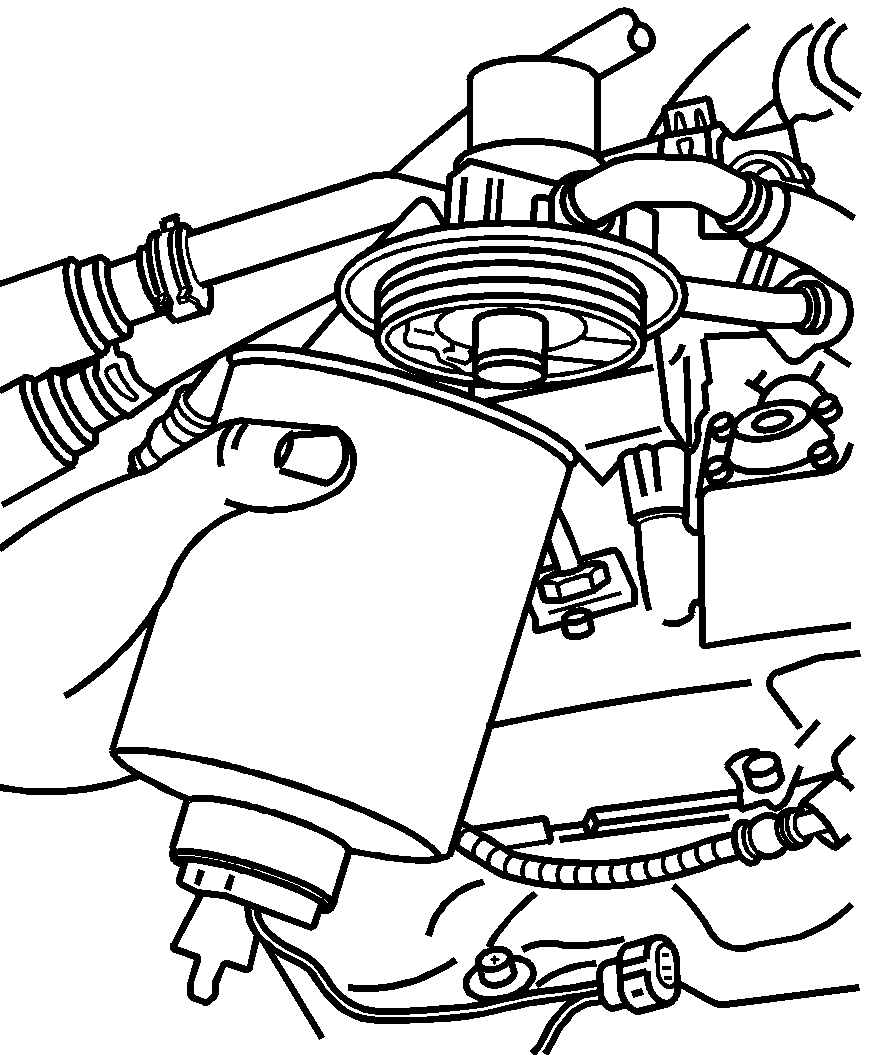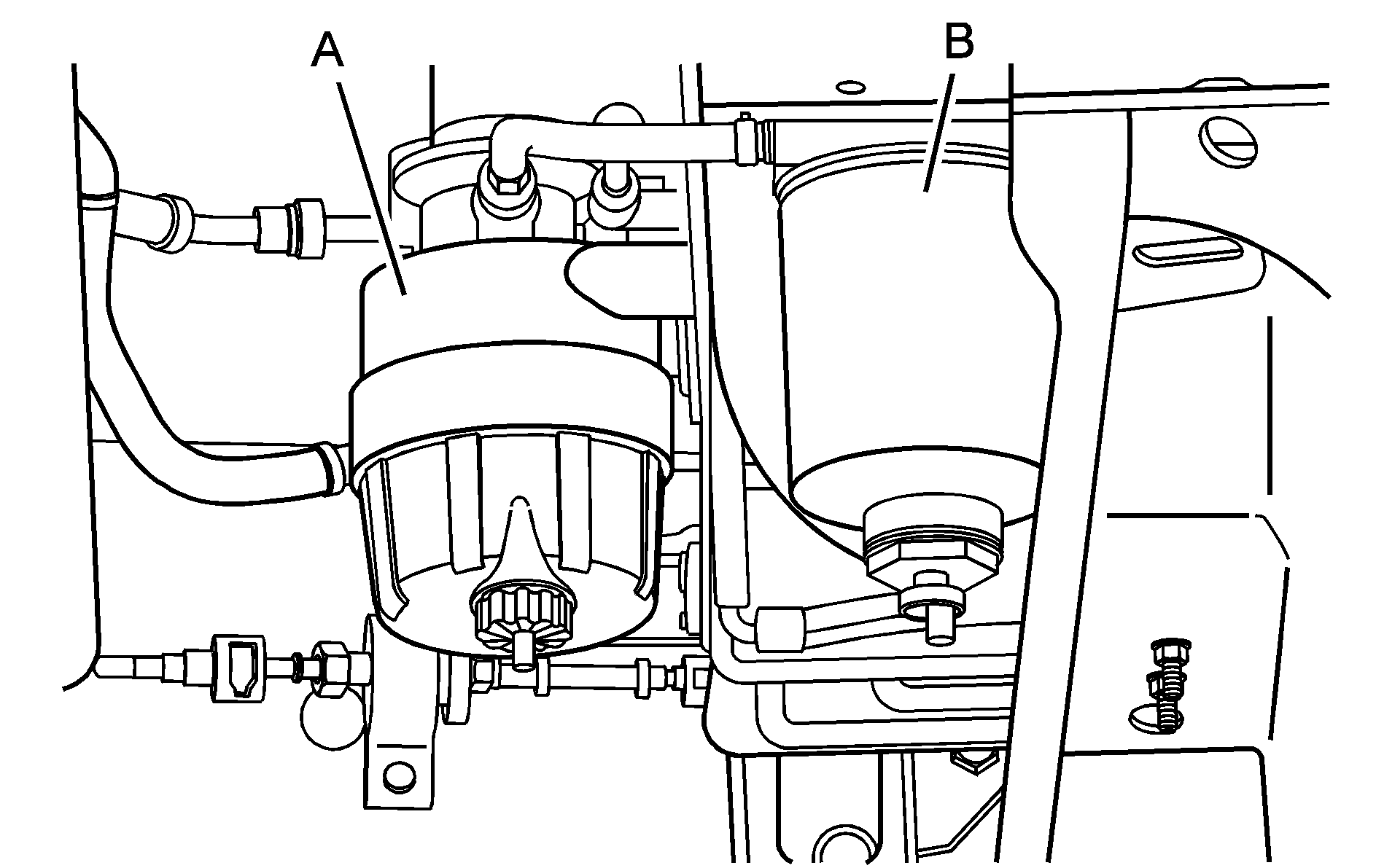Pickup Models
If you want to change the fuel filter yourself, here's how to do it:
Caution: Diesel fuel is flammable. It could start a fire if something ignites it, and you could be burned. Do not let it get on hot engine parts, and keep matches or other ignition sources away.
First, drain any water from the filter following the procedure for draining water listed previously.
Your vehicle's engine should be off until the end of this procedure.
The fuel filter is located in the engine compartment on the passenger's side of the vehicle, or on the driver's side frame rail in front of the fuel tank.
- Apply the parking brake.
- Unplug the water sensor wire connected to the fuel filter and unscrew the filter element.
- Remove the filter element. If there is any dirt on the filter sealing surface, clean it off. Remove and reuse the water sensor float switch located on the bottom of the fuel filter.
- Install the new filter element.
- Reinstall and tighten the filter container and reconnect the water sensor wire to the filter.
- Use the fuel filter priming procedure earlier in this section to prime the fuel filter.
- Tighten the air bleed valve by turning it clockwise until hand tight.
- Start your engine and let it idle for five minutes. Check your fuel filter and air bleed valve for leaks.
- Reset the fuel filter monitor. See Driver Information Center (DIC) for more information.

Van Models
If your fuel operated heater (FOH) is not working, your FOH line requires priming. See your dealer for service. See Fuel Operated Heater (FOH) for more information.
If you want to change the fuel filter yourself, here's how to do it:
Caution: Diesel fuel is flammable. It could start a fire if something ignites it, and you could be burned. Do not let it get on hot engine parts, and keep matches or other ignition sources away.
First, drain any water from the filter following the procedure for draining water listed previously.
Your vehicle's engine should be off until the end of this procedure.
The fuel filters are located on the driver's side frame rail in front of the fuel tank.
Primary Filter (A)
- Apply the parking brake.
- Unplug the water sensor wire connected to the fuel filter (lowest wire) and unscrew the filter's cap.
- Remove the filter element. If there is any dirt on the filter sealing surface, clean it off.
- Install the new filter element.
- Reinstall and tighten the filter's cap and reconnect the water sensor wire to the filter.
- Prime the fuel system.
- Start your engine and let it idle for five minutes.

Secondary Filter (B)
- Apply the parking brake.
- Unscrew the filter element.
- Remove the filter element. If there is any dirt on the filter sealing surface, clean it off. Remove and reuse the water drain valve located at the bottom of the fuel filter.
- Install and tighten the new filter element.
- Prime the fuel system.
- Start your vehicle and let it idle for five minutes.
Pickup Models
If you want to change the fuel filter yourself, here's how to do it:
Caution: Diesel fuel is flammable. It could start a fire if something ignites it, and you could be burned. Do not let it get on hot engine parts, and keep matches or other ignition sources away.
First, drain any water from the filter following the procedure for draining water listed previously.
The vehicle's engine must be off until the end of this procedure.
The fuel filter is located in the engine compartment on the passenger side of the vehicle.
- Apply the parking brake. Access the fuel filter through the passenger side wheel house opening. It is not necessary to remove all of the wheel liner fasteners.
- Remove only the necessary fasteners to allow the rear of the wheel liner to be lowered enough for fuel filter access.
- Unplug the water sensor wire connected to the fuel filter and unscrew the filter element.
- Remove the filter element. If there is any dirt on the filter sealing surface, clean it off. Remove and reuse the water sensor float switch located on the bottom of the fuel filter.
- Install the new filter element.
- Reinstall and tighten the filter container and reconnect the water sensor wire to the filter.
- Reposition the wheel liner.
- Install and tighten fasteners.
- Use the fuel filter priming procedure earlier in this section to prime the fuel filter.
- Tighten the air bleed valve by turning it clockwise until hand tight.
- Start the engine and let it idle for five minutes. Check the fuel filter and air bleed valve for leaks.
- Reset the fuel filter monitor. See DIC Warnings and Messages for more information.

Van Models
If the fuel operated heater (FOH) is not working, the FOH line requires priming. See your dealer/retailer for service. See Fuel Operated Heater (FOH) for more information.
If you want to change the fuel filter yourself, here's how to do it:
Caution: Diesel fuel is flammable. It could start a fire if something ignites it, and you could be burned. Do not let it get on hot engine parts, and keep matches or other ignition sources away.
First, drain any water from the filter following the procedure for draining water listed previously.
The vehicle's engine must be off until the end of this procedure.
The fuel filters are located on the driver side frame rail in front of the fuel tank.
To minimize fuel siphoning from the fuel tank during fuel filter replacement, be sure the fuel tank is less than 3/4 full.
Primary Filter (A)
- Apply the parking brake.
- Unplug the water sensor wire connected to the fuel filter (lowest wire) and unscrew the filter's cap.
- Remove the filter element. If there is any dirt on the filter sealing surface, clean it off.
- Install the new filter element.
- Reinstall and tighten the filter's cap and reconnect the water sensor wire to the filter.
- Prime the fuel system.
- Start the engine and let it idle for five minutes.

Secondary Filter (B)
- Apply the parking brake.
- Unscrew the filter element.
- Remove the filter element. If there is any dirt on the filter sealing surface, clean it off. Remove and reuse the water drain valve located at the bottom of the fuel filter.
- Install and tighten the new filter element.
- Prime the fuel system.
- Start the vehicle and let it idle for five minutes.
